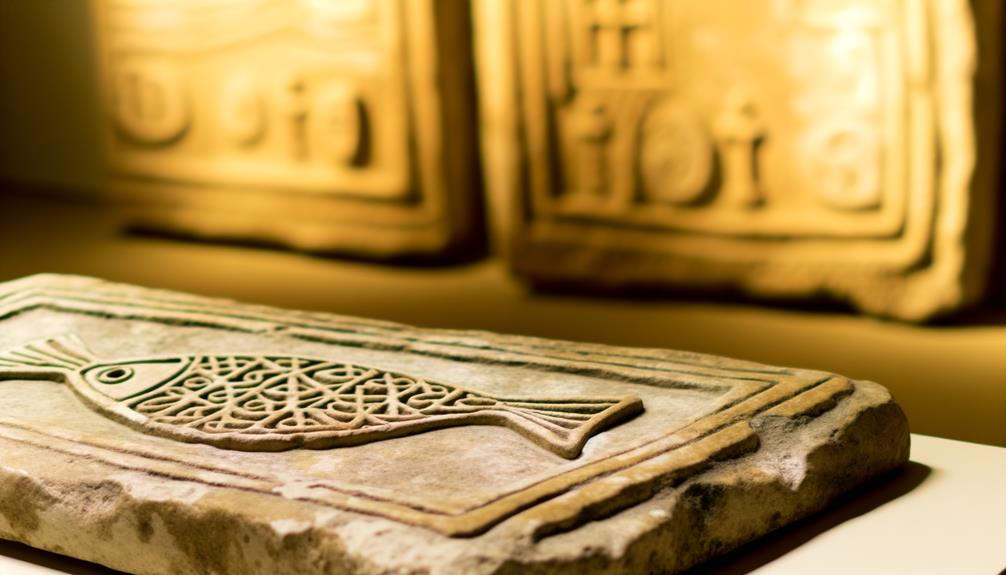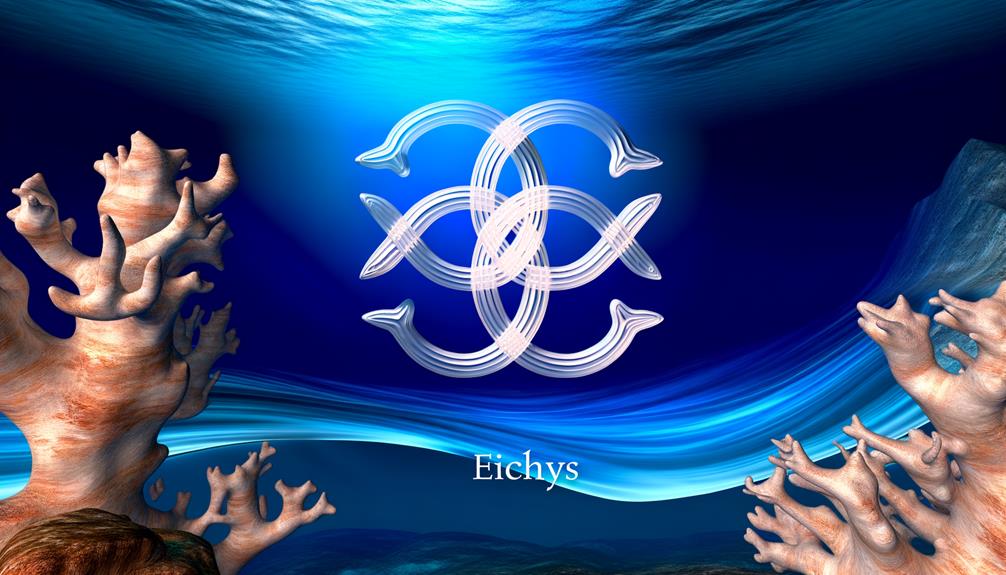Spiritual Meaning of Fish Symbol: Faith and Abundance
The spiritual meaning of the fish symbol encompasses transformation, renewal, and divine provision. It originates from early Christians who used the Ichthys as a secret identifier during Roman persecution, with the Greek acronym translating to ‘Jesus Christ, Son of God, Savior.’ Scripturally, Jesus called his disciples to be ‘fishers of men‘ (Matthew 4:19), solidifying its importance.
Ancient cultures also revered fish, linking them to fertility, abundance, and divine wisdom. In modern times, the fish symbolizes faith, intuition, and spiritual growth.
There’s a rich tapestry of spiritual and historical contexts that make the fish symbol deeply significant—there’s much more to uncover.

Spiritual Meaning of Fish Symbol: Faith, Abundance & Divine Wisdom
| Symbolism | Spiritual Meaning |
|---|---|
| Faith & Belief | In Christian symbolism, represents wisdom and trust in higher power. |
| Subconscious Flow | Symbolizes hidden knowledge emerging from the soul’s depths. |
| Abundance | Suggests prosperity flowing like water—emotionally and materially. |
| Spiritual Depth | Reflects profound inner insight and metaphysical exploration. |
| Divine Guidance | A reminder of ongoing spiritual support and nourishment. |
Origins of the Fish Symbol

The origins of the fish symbol, also known as the Ichthys, can be traced back to early Christianity where it served as a secret sign among believers during periods of persecution.
In the New scripture, Jesus calls his disciples to become ‘fishers of men‘ (Matthew 4:19), which underpins the symbol’s spiritual significance.
Early Christians used the Ichthys as a covert identifier, drawing one arc of the fish in the dirt, waiting for the other person to complete it if they were also a believer. This practice arose during Roman persecutions, when openly practicing Christianity could lead to death.
The Greek word for fish, Ichthys, is an acronym for ‘Jesus Christ, Son of God, Savior,’ encapsulating core Christian beliefs in a simple symbol.
Fish in Ancient Cultures
You might find it fascinating that in ancient mythology, fish often symbolized fertility and abundance, as seen in the Mesopotamian goddess Atargatis, who was depicted as a fish deity.
The cultural and religious significance of fish spans various traditions, from the ichthys symbol in early Christianity to the sacred fish ponds in ancient Egyptian temples.
Historical texts and scriptures repeatedly highlight fish as powerful spiritual symbols, reflecting a deep reverence across different civilizations.
Symbolism in Mythology
In ancient cultures, fish often symbolized fertility, transformation, and the mysteries of the deep, as evidenced by their frequent appearances in mythology and religious texts.
In Greek mythology, Aphrodite and her son Eros transformed into fish to escape the monster Typhon, representing rebirth and protection.
In Hinduism, Vishnu’s first avatar, Matsya, a fish, saved sacred texts from a great flood, symbolizing divine intervention and preservation of wisdom.
Similarly, in Ancient Egypt, the Nile’s abundant fish were seen as signs of life-giving fertility. According to the Book of the Dead, fish were also guides for the soul’s journey in the afterlife.
Religious and Cultural Significance
Across various ancient cultures, fish held profound religious and cultural significance, often depicted in sacred texts and rituals as symbols of life, protection, and divine wisdom.
In Mesopotamia, the god Enki, associated with water and creation, was often represented by fish.
In Hinduism, the Matsya avatar, a fish incarnation of Vishnu, rescued sacred scriptures from a great flood.
Ancient Egyptians revered fish in their art, linking them to fertility and rebirth, particularly in the context of the Nile’s life-giving waters.
The Chinese saw fish as symbols of abundance and wealth, frequently featured in their New Year celebrations.
Understanding these cultural contexts helps you appreciate how deeply the symbolic meanings of fish are intertwined with humanity’s spiritual heritage.
Christian Ichthys Symbol

You’ll find the Christian Ichthys symbol deeply rooted in early Christian history, used as a secret sign among persecuted believers.
Referencing Matthew 4:19, where Jesus calls His disciples to be ‘fishers of men,’ the symbol embodies profound religious significance.
Today, it’s seen on bumper stickers and jewelry, reflecting its enduring cultural impact.
Historical Origins Explained
Drawing from early Christian practices, the Ichthys symbol, which resembles a simple fish, emerged as a clandestine emblem of faith during times of persecution, especially under Roman rule.
To understand its historical origins, consider these points:
- Scriptural Basis: The fish is mentioned in the Gospels, especially in Matthew 4:19 where Jesus says, ‘Follow me, and I’ll make you fishers of men.’
- Greek Acronym: Ichthys (ΙΧΘΥΣ) stands for ‘Jesus Christ, Son of God, Savior.’
- Secret Code: Early Christians used the symbol to safely identify fellow believers.
- Catacombs: Fish symbols are found in Roman catacombs as markers of Christian graves.
This historical context underscores the symbol’s covert yet powerful significance.
Symbolic Religious Significance
Building on its historical roots, the Ichthys symbol carries profound spiritual significance in Christian theology, embodying beliefs about Jesus as the divine Savior and the call to discipleship.
The Greek acronym for ‘Jesus Christ, Son of God, Savior’ (ΙΧΘΥΣ) underscores its theological depth.
Early Christians used it as a covert identifier during Roman persecutions, drawing on Jesus’ call to His disciples to become ‘fishers of men‘ (Matthew 4:19).
The fish symbol also references miracles like the feeding of the 5,000 (John 6:1-14), reinforcing Christ’s provision and divine authority.
By using the Ichthys, early believers affirmed their faith and unity, encapsulating core doctrines amidst adversity.
Understanding its origins enriches your grasp of its enduring significance.
Modern Cultural Impact
In contemporary culture, the Ichthys symbol frequently appears on car decals, jewelry, and business logos, signifying a public declaration of one’s Christian faith and identity.
Rooted in early Christian history, the Ichthys, derived from the Greek word for fish, often encapsulates profound scriptural references such as Jesus’ calling of the apostles as ‘fishers of men’ (Matthew 4:19).
By displaying this symbol today, you’re connecting with:
- Early Christian tradition and secret communication.
- A visual shorthand for ‘Jesus Christ, Son of God, Savior.’
- A reminder of the feeding of the 5000 (John 6:1-14).
- A demonstration of faith in everyday life.
Understanding its historical context enriches your appreciation of its enduring cultural impact.
Fish in Eastern Philosophies
Throughout Eastern philosophies, fish often symbolize transformation, fertility, and spiritual abundance, deeply rooted in texts like the I Ching and the Bhagavad Gita.
In the I Ching, fish represent the concept of change and adaptability, reflecting life’s fluid nature. The Bhagavad Gita, with its rich tapestry of metaphors, uses fish to signify the soul’s journey and spiritual awakening.
Historical texts from Buddhist traditions also highlight fish as symbols of freedom and liberation, tying into the idea of transcending the cycle of birth and death.
In Taoism, fish embody the harmonious flow of energy, or Qi, essential for maintaining balance within oneself.
Symbol of Abundance

Fish have long symbolized abundance in various cultures, often depicted in ancient scriptures and historical artifacts as harbingers of prosperity and plenty.
You’ll find that fish are revered in:
- Christianity: Jesus’ miracle of the loaves and fishes illustrates divine provision.
- Hinduism: Matsya, the fish avatar of Vishnu, signifies sustenance and salvation.
- Chinese culture: Fish are emblematic of wealth and good fortune, especially during Lunar New Year.
- Greek mythology: Fish were sacred to Aphrodite, representing fertility.
Each instance underscores fish as a timeless emblem of life’s bountiful gifts.
Understanding these references offers insight into how deeply ingrained the symbol of fish is in global conceptions of abundance.
Transformation and Renewal
Rooted in ancient traditions and religious texts, the fish symbol frequently represents transformation and renewal, echoing themes of rebirth and spiritual growth across various cultures.
In Christianity, Jesus’s miracle of feeding the 5,000 with fish signifies spiritual nourishment and renewal (John 6:1-14). Similarly, in Hinduism, Matsya, the fish avatar of Vishnu, symbolizes cosmic renewal and the preservation of life.
The fish’s ability to navigate water—a symbol of the subconscious—indicates spiritual transformation, as seen in the transformative journeys of Buddhist monks. The ancient Greeks also revered fish, associating them with Aphrodite, the goddess of love and rebirth.
Modern Spiritual Significance

In today’s spiritual landscape, the fish symbol continues to resonate deeply, embodying themes of personal growth and intuitive wisdom. You might find its significance reflected in various modern contexts:
- Personal Development: Symbolizes your journey towards self-awareness and spiritual maturity.
- Intuition: Represents trusting your inner voice, akin to the fish’s natural navigation in water.
- Christian Faith: Continues to be a covert emblem of fidelity, harking back to early believers.
- Eastern Philosophies: Often linked to prosperity and the flow of life’s energies, as seen in Feng Shui.
- Dream Interpretation: Seeing fish can signify subconscious messages or spiritual guidance.
Conclusion
In summation, the fish symbol’s rich tapestry weaves through ancient cultures, Christian scripture, and Eastern philosophies, embodying profound spiritual truths.
As an emblem of abundance, it subtly conveys life’s plenitude. Its transformative essence, akin to a metaphysical metamorphosis, invites personal renewal.
Today, the fish remains a beacon of spiritual guidance, bridging past wisdom with modern introspection.
Through this symbol, you’re gently reminded of life’s deeper currents and the perennial journey towards enlightenment.






